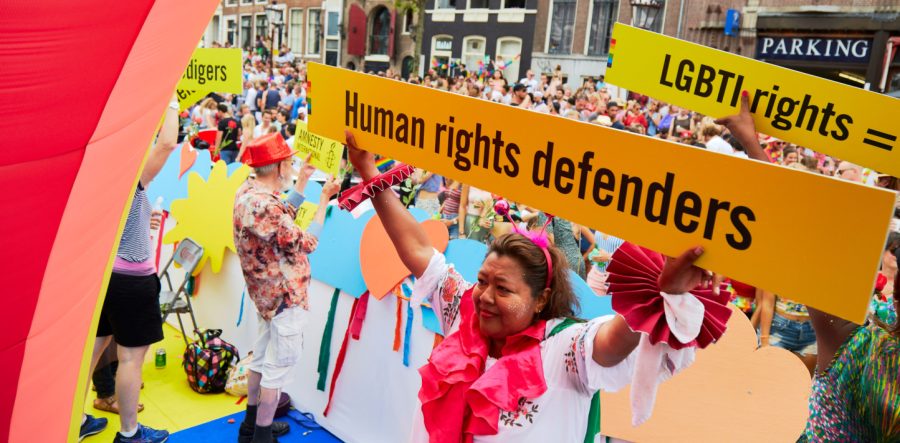Using our (Spanish) Voices to Challenge Global Inequalities
January 19, 2022
Mrs. Meatto’s Spanish classes not only teach students to use the language, but also to engage with the cultures and issues that exist in the Spanish-speaking world.
In the unit called “El poder de mis palabras” or “The Power of My Words,” Ms. Meatto’s Spanish III students learn to use their voices to demand justice against the violation of human rights in Spanish-speaking countries. Ms. Meatto recognizes that creating a persuasive argument in the Spanish language is a new experience for many of her students and commented that the project “is the first time many of my students use their Spanish authentically for a Spanish-speaking audience. It is so important to me that my students get to be students in the safety and guidance of a classroom and also individuals engaging with the world so that their learning has a real purpose.”
Amnesty International, a non-governmental organization focused on human rights, conducts a yearly campaign called “Write for Rights” that encourages people to compose letters to government officials, people of high stature, or anyone that has decision-making power. Ms. Meatto has participated in this campaign for the past four years, delivering 371 letters just this year written by her Spanish III students. In their letters, the writers explain how the issues they address are violations of basic human rights, and provide solutions to the issues. Upon receipt of the letters and petitions, those in power will hopefully take the necessary steps to resolve the detrimental situation.
Amnesty International’s website states that Write for Rights is the biggest human rights campaign in the world and, in 2021, celebrated the event’s 20th anniversary. According to Agnès Callamard, Amnesty International’s Secretary General, “The Write for Rights campaign signifies everything Amnesty stands for – people from all over the world coming with one voice, in global solidarity, to challenge injustice. …whether that’s through a tweet, a signature or a letter to those in authority. Sometimes the smallest act can make the biggest difference. The last 20 years of Write for Rights shows words really do have power.”
Ms. Meatto mentioned that the learning goal of the project extends beyond language acquisition:
“Through this unit, I want students to become competent with the subjunctive in noun clauses, commands, and current-events vocabulary in spontaneous, paragraph-length speaking and writing. I also want students to pick up the main idea and some details in informative videos and articles and for students to develop intercultural skills by exploring their role in the Spanish-speaking world. All these skills are at the center of the project. From there, I always try to frame a unit around real-world purpose, audience, and student choice. Advocating for universal human rights achieves this and also draws on all the language and intercultural skills I want students to develop in this unit, so it’s lucky December is both human rights month and the month we work on these skills in Spanish III. I hope students takeaway language and intercultural skills from this unit and also a better sense of self and purpose as Spanish-language learners.”
The project begins when Ms. Meatto provides a list of current human rights issues in Spanish-speaking countries and asks her students to select the one they feel is most important to them.
In order to send as many petitions as possible, the students then describe their chosen issue to other students on the St. Luke’s campus, stressing the importance of finding a solution and encouraging peers to sign their letter as well. More signatures show the authorities that many global citizens are aware of the human rights violations that exist in their respective countries, and hopefully this will drive change. As a test at the end of the unit, after the letter-writing campaign, students choose from two new human rights issues to write a letter and make an oral pitch for, on the spot. Mrs. Meatto mails these out and evaluates the writing and speaking.
Overall, the students found the project challenging by stretching their knowledge of the Spanish language, but they also found it rewarding by helping others. Spanish III student CC. Buono ‘23 felt that this project not only improved her command of the Spanish language, but also brought awareness to some horrific human rights violations.
CC said, “Learning about the human rights violations was shocking and disturbing. Composing a letter in the Spanish language was challenging, but true challenges are those experienced by the innocent people who face unjust situations.”
With National Human Rights Day on December 10, this Spanish III project is an excellent way to bring awareness to this day, while also giving the students a deeper insight into human rights violations around the globe. Many students found this project eye-opening; defending the human rights of those unable to defend themselves brought a deeper meaning to students and a unique learning experience into a Spanish class. Additionally, the students participating in this campaign improved their Spanish speaking, writing, and listening skills. For anyone interested in helping fight human rights violations, please visit www.amnesty.org to see how you can help.





Cessa • Feb 9, 2022 at 1:41 pm
Great article, Kiley! Look forward to reading more 🙂